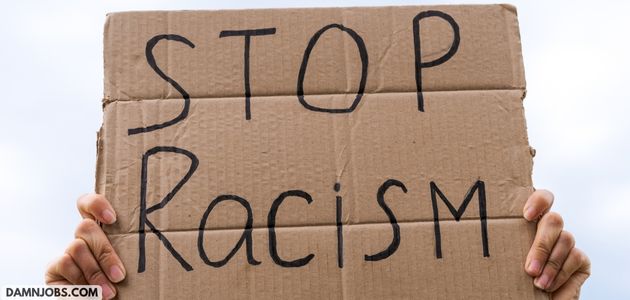In the modern world, the fight against racism remains an ongoing battle, even in seemingly objective processes like job applications.
Studies continue to unveil disparities in callback rates based on the perceived ethnicity of applicants’ names, echoing the persistent grip of racial bias in employment practices.
Recent research, exemplified by studies such as the “Discrimination Report Card,” underscores the sobering reality: job seekers with names perceived as Black face systemic obstacles.
The report’s findings paint a stark picture, revealing that applicants with names deemed “white-sounding” are favored over those with “Black-sounding” names by a significant margin.
However, amidst these discouraging statistics lies a crucial message of resilience and empowerment. Evan K. Rose, an economist and co-author of the report, emphasizes the importance of recognizing these patterns.
Rather than succumbing to the pressure to conform or disguise one’s racial identity, he advocates for awareness and empowerment.
Rose urges job seekers, especially those from historically marginalized groups, to acknowledge the landscape of discrimination while refusing to yield their cultural identity.
Understanding where bias may exist can arm applicants with knowledge, enabling them to navigate the job market with greater insight and resilience.
Moreover, the call to action extends beyond individual empowerment. We catalyze a broader conversation about systemic change by shedding light on discriminatory practices and holding companies accountable.
Companies must be prompted to reassess their policies and practices, fostering environments that prioritize diversity, equity, and inclusion.
In the face of adversity, reclaiming agency and standing firm in one’s identity is crucial. Job seekers should feel free to refrain from diluting or concealing their racial background to fit into a biased system.
Instead, they should proudly embrace their heritage, recognizing that progress lies in challenging and dismantling systemic barriers to equality.
As we strive for a more just and inclusive society, let us remember that diversity is not a hindrance but a strength. By embracing our identities and confronting discrimination head-on, we pave the way for a future where every individual is valued and empowered, regardless of race or ethnicity.
Should You Hide Your Race?
In the quest for employment, job applications serve as the gateway to opportunities. Yet, beneath the veneer of objectivity often lies a troubling reality: racism persists in the job market.
Studies reveal stark disparities in callback rates based on the perceived ethnicity of applicants’ names, highlighting systemic biases that continue to plague the hiring process.
Against this backdrop, a pressing question emerges: should you hide your race on job applications? While some argue for transparency, contending that concealing race perpetuates invisibility and denies the realities of discrimination, others advocate for strategic omission, asserting that revealing race may inadvertently subject applicants to bias.
In exploring this dilemma, it becomes apparent that the decision is deeply nuanced, shaped by individual circumstances, systemic inequities, and broader societal considerations.
At the heart of the debate lies the tension between authenticity and pragmatism. On one hand, proponents of transparency argue that concealing race undermines efforts to address systemic racism.
By openly declaring one’s racial identity, they contend, applicants challenge discriminatory practices and assert their right to be seen and valued as individuals, irrespective of race.
Conversely, advocates for strategic omission emphasize the harsh realities of racial bias in hiring. Studies consistently demonstrate that applicants with names perceived as white receive more callbacks than those with names perceived as Black or ethnic.
In such a climate, they argue, concealing race becomes a strategic imperative—a means of leveling the playing field and circumventing prejudice.
Crucially, the decision to hide one’s race must be contextualized within the broader landscape of privilege and disadvantage. For marginalized communities disproportionately impacted by systemic racism, strategic omission may offer a semblance of protection against discrimination.
However, for individuals who benefit from racial privilege, withholding race may perpetuate disparities and undermine efforts to address structural inequities.
Moreover, the voluntariness of disclosing race on job applications adds another layer of complexity to the debate. While some applications include optional fields soliciting racial information, others omit this inquiry altogether.
In such instances, the decision to reveal or conceal race becomes a matter of agency—a choice imbued with personal significance and societal implications.
Critics of voluntary disclosure argue that such inquiries perpetuate racial profiling and reinforce discriminatory practices. By inviting applicants to divulge their race, they contend, employers effectively sanction bias and perpetuate inequities in hiring.
In response, advocacy groups and policymakers have called for the removal of racial identifiers from job applications, advocating for blind recruitment processes that prioritize merit over racial identity.
Yet, proponents of voluntary disclosure assert that such inquiries are essential for tracking diversity metrics and monitoring progress towards equitable representation.
By collecting demographic data on applicants, they argue, employers can identify disparities in hiring practices and implement targeted interventions to promote diversity and inclusion.
Amidst these competing perspectives, the imperative remains clear: dismantling systemic racism requires collective action and structural change. While strategic omission may offer temporary relief from discrimination, it does little to address the root causes of racial bias in hiring.
Instead, efforts must focus on transforming organizational cultures, challenging implicit biases, and fostering inclusive hiring practices that prioritize merit and diversity.
Ultimately, the decision to hide or reveal race on job applications is deeply personal and contingent upon individual circumstances. For some, transparency may serve as a form of resistance—a defiant assertion of identity in the face of adversity.
For others, strategic omission may offer a pragmatic means of navigating a biased system and securing employment opportunities.
However, irrespective of individual choices, the onus remains on employers and policymakers to address the pervasive scourge of racism in hiring.
By fostering inclusive workplaces, implementing blind recruitment processes, and challenging discriminatory practices, we can create a future where every individual is valued and empowered, irrespective of race or ethnicity.

